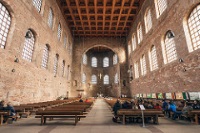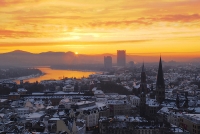The Rhineland Travel Guide
The Rhine River winds through Germany amid a fertile valley of villages, castles, mountains and vineyards. An important trade route for the last two millennia, the Rhine and the towns that have sprung up along its banks exhibit all the tradition and charm of that rich history, making it a popular region for tourism and a really exciting area to explore.
Each section of the Rhineland has its own attractions, including the winelands of Rheinhessen, the hiking trails of Westerwald, the mineral springs of Ahr and the historic Roman and Celtic settlements of Hunsruck. The region is full of fairytales and mythology, and has inspired tales such as Wagner's epic Ring Cycle and those written by Byron, Goethe and Mark Twain.
Today, bustling small towns along the river such as Mainz, Trier, Koblenz, Neustadt an der Weinstrasse and Worms all provide charms of their own. Larger cities such as Cologne, Bonn and Düsseldorf are attracting business to their growing metropolises and offer more cosmopolitan shopping and dining options. The variety of experiences makes the Rhineland a perfect holiday destination for just about anyone, and one of the best ways to explore is by cruising down the river itself.
Things to do in The Rhineland
Tourism in the beautiful Rhineland revolves around the ancient river trade route and the several wonderful settlements along its banks. Interesting things to see and do in the Rhineland can be divided fairly evenly between the historical and the contemporary. The area is a hub of contemporary trade and its cities are trendy and modern, while its small villages exude country charm and picturesque settings. Attractions in the Rhineland include museums, fashion shows, churches, nightclubs and everything in between.
One of the largest cities in Germany, Cologne is home to some astounding Gothic and Romanesque architecture and a colourful social life that takes full advantage of its lovely outdoor spots during the sunny summer months. Elsewhere, Düsseldorf is ancient, ironically now famous for its modern architecture. Once elegant but badly damaged in the war, it chose to reinvent itself as a cutting-edge, fashionable centre of trade.
Mainz, the capital of the Rhineland, is an interesting mixture of medieval and modern architecture and was the birthplace of Johannes Gutenberg, inventor of the printing press. Trier, Germany's oldest city, has five UNESCO World Heritage Sites and is a dream for the historical sightseer, while Bonn is vibrant and enjoys a fun nightlife scene fuelled by its large student population. Home to some wonderful museums and galleries, Bonn is perhaps most famous for being the birthplace of Beethoven and many of its attractions revolve around his life and music.

Trier
Tourists are drawn to Germany's oldest city of Trier for a taste of ancient Rome. Founded as a colonial capital under Emperor Augustus in 16 BC, the city became an important political and cultural centre, and many Roman buildings and monuments remain to be explored by visitors.
The city has at least five UNESCO World Heritage Sites: St Peter's Cathedral, a remarkable 11th-century church holding several significant tombs; The Black Gate, dating back to around 180 AD; 2,000-year-old ruins of an Imperial Roman bath complex once frequented by Constantine; the Church of Our Lady, another beautiful church adjacent to the cathedral; and the Amphitheatre, dating back to the 2nd century.
Nearby, the Mosel Valley is Germany's main wine region and is filled with vineyards and cellars that will delight connoisseurs. Many visitors love to embark on cruises down the scenic Mosel River.

Mainz
The capital of the Rhineland, Mainz is a bustling city with a curious but exciting mixture of medieval architecture and gleaming office blocks. The city is over 2,000 years old and mixes the old and the new with alacrity. The Dom und Diözesanmuseum dominates the skyline in the centre of town, and St Stephen's Church, with its original Chagall stained-glass windows, is a popular attraction in the Old Town. History lovers will also relish the Schillerplatz square. The city is compact enough to enjoy walking tours around town or along the Rhine, with the Kaiserstraße boasting an attractive pedestrian boulevard and church.
Mainz is the birthplace of Johannes Gutenberg, inventor of the printing press, making books a popular souvenir from the city. The museum dedicated to Gutenberg is a highlight for those interested in the revolution sparked by the printed word. The museum includes a working replica of Gutenberg's printing press and is housed in a beautiful old building.

Bonn
The birthplace of Beethoven and one of the oldest cities in Germany, Bonn is a journey through time. There are numerous fascinating sites from the medieval to the modern, from the galleries and museums on Museum Mile to its several beautiful churches, two of which date back to the 11th century.
On sunny days, visitors can enjoy spending a few hours in the Arboretum, Botanical Garden or any of the other pleasant parks in Bonn. The adventurous can climb the extinct volcano on the border of Wachtberg and Rhineland-Palatinate. Classical music lovers should visit the Beethoven House, which owns the world's largest collection of artefacts and memorabilia, including several of his pianos; the chamber music hall hosts regular performances of his works.
Germany travel info
Electricity
230 volts, 50Hz. European-style two-pin plugs are standard.
Language
German is the official language. English is also widely spoken and understood.
Money
The unit of currency is the Euro (EUR), divided into 100 cents. ATMs and exchange bureaux are widely available. The major credit cards are widely accepted in large shops, hotels and restaurants. The quickest and most convenient way to change money is to obtain cash from one of the ATMs that are ubiquitous features on all German streets. Banks are closed on weekends, but exchange bureaux at airports and main railway stations are open daily.
Tipping
German law stipulates that all prices, menus and bills include both tax and a service charge, so tipping is not necessary in restaurants. Cleaning staff, hairdressers, taxi drivers and other menial services appreciate small tips.
Health
There are no serious health risks for visitors to Germany and no vaccinations are required. The German health service is excellent and there is a reciprocal health agreement with most EU countries, whose citizens are entitled to free medical and dental treatment on presentation of a European Health Insurance Card (EHIC). After Brexit, the Global Health Insurance Card (GHIC) replaced the European Health Insurance Card (EHIC) for UK citizens. The GHIC allows UK citizens access to state healthcare during visits to the EU. The GHIC is not valid in Norway, Iceland, Liechtenstein or Switzerland, nor is it an alternative to travel insurance. Nationals of other countries should take out travel insurance.
Safety
A visit to Germany should be trouble free, but visitors should take normal precautions to avoid mugging, bag-snatching and pick-pocketing, especially at airports, railway stations and markets in the large cities.
Local customs
Visitors are not required to carry their passports with them at all times in Germany, but carrying some form of identification is advised. Smoking in public places such as bars and restaurants is illegal.
Doing business
In Germany, business is conducted in a formal manner, with a conservative and formal dress code being the norm. Punctuality is vital at all meetings and it's considered rude to be late. Germans use titles often, with men referred to as 'Herr' and women as 'Frau', followed by their last names.
Meetings are often purely business and may not occur over lunches, which are generally more social. Shaking hands at the beginning and end of the meeting is common. Business hours are generally 9am to 6pm Monday to Friday, with an hour taken over lunch.
Duty free
Passengers arriving from EU countries can enter Germany without paying duty on 800 cigarettes or 400g cigarillos or 200 cigars or 1kg tobacco; 90 litres of still wine; 110 litres of beer; and 10 litres of alcohol stronger than 20 percent or 20 litres of fortified wine, sparkling wine or other liqueurs up to 22 percent.
Passengers arriving from non-EU countries, over the age of 17, can enter Germany without paying duty on 200 cigarettes or 100 cigarillos or 50 cigars or 250g smoking tobacco; 4 litres of wine and 16 litres of beer and 1 litre of spirits over 22 percent volume; or 2 litres of spirits under 22 percent volume. Other goods to the value of €430 for travellers arriving by air or sea, and €300 for travellers arriving by land.
Communications
The international access code for Germany is +49. Travellers will find it easy to use a local SIM card, Skype, WhatsApp or similar apps. Free WiFi is available in most hotels, cafes and restaurants.
Passport & Visa
The borderless region known as the Schengen Area includes the following countries: Austria, Belgium, Czech Republic, Denmark, Estonia, Finland, France, Germany, Greece, Hungary, Iceland, Italy, Latvia, Lithuania, Luxembourg, Malta, The Netherlands, Norway, Poland, Portugal, Slovakia, Slovenia, Spain, Sweden, and Switzerland. All these countries issue a standard Schengen visa that has a multiple entry option, and which allows the holder to travel freely within the borders of all the aforementioned countries. Additionally, non-EEA members require proof of onward or return tickets, the necessary travel documentation for their next destination, and sufficient funds to support themselves while in Germany. Citizens of Australia, Canada, Israel, Japan, New Zealand, Switzerland, and the USA are exempt from the requirement to hold onward tickets.
It is highly recommended that travellers' passports have at least six months' validity remaining after the intended date of departure from their travel destination. Immigration officials often apply different rules to those stated by travel agents and official sources.
Entry requirements
US citizens must have a passport that is valid for three months after the period of intended stay in Germany. A visa is not required for stays of up to 90 days within a 180 day period.
UK citizens must have a passport that is valid for three months after the period of intended stay in Germany. A visa is not required for stays of up to 90 days within a 180 day period.
Canadian citizens must have a passport that is valid for three months beyond the period of intended stay in Germany. A visa is not required for stays of up to 90 days within a 180 day period.
Australian citizens must have a passport that is valid for three months beyond the period of intended stay in Germany. A visa is not required for stays of up to 90 days within a 180 day period.
South African citizens must have a passport that is valid for three months beyond the intended period of stay, and a valid Schengen visa, to enter Germany. Note that Temporary passports will not be recognised.
Irish citizens must have a passport that is valid on arrival in Germany. A visa is not required.
New Zealand citizens must have a passport that is valid for three months beyond the period of intended stay in Germany. A visa is not required for stays of up to 90 days within a 180 day period.
Useful contacts
German National Tourist Board, Frankfurt: +49 (0)69 751 903 or www.germany-tourism.de
110 (Police); 112 (Ambulance/Fire)Embassies / consulates in other countries
German Embassy, Washington DC, United States: +1 202 298 4000.
German Embassy, London, United Kingdom: +44 20 7824 1300.
German Embassy, Ottawa, Canada: +1 613 232 1101.
German Embassy, Canberra, Australia: +61 (0)2 6270 1911.
German Embassy, Pretoria, South Africa: +27 (0)12 427 8900.
German Embassy, Dublin, Ireland: +353 (0)1 269 3011.
German Embassy, Wellington, New Zealand: +64 (0)4 473 6063.
Embassies / consulates in Germany
United States Embassy, Berlin: +49 (0)30 83050.
British Embassy, Berlin: +49 (0)30 20 4570.
Canadian Embassy, Berlin: +49 (0)30 203 120.
Australian Embassy, Berlin: +49 (0)30 880 0880.
South African Embassy, Berlin: +49 (0)30 220 730.
Irish Embassy, Berlin: +49 (0)30 220 720.
New Zealand Embassy, Berlin: +49 (0)30 206 210.



